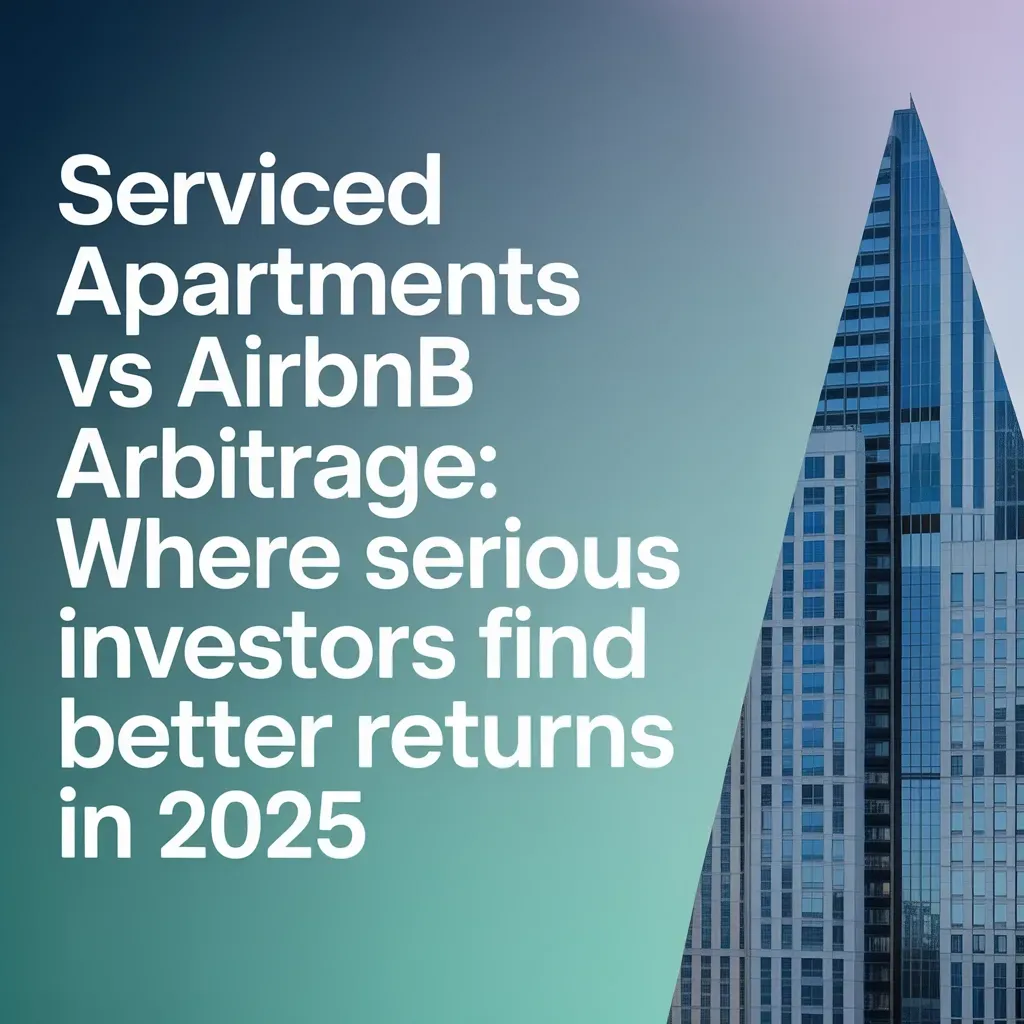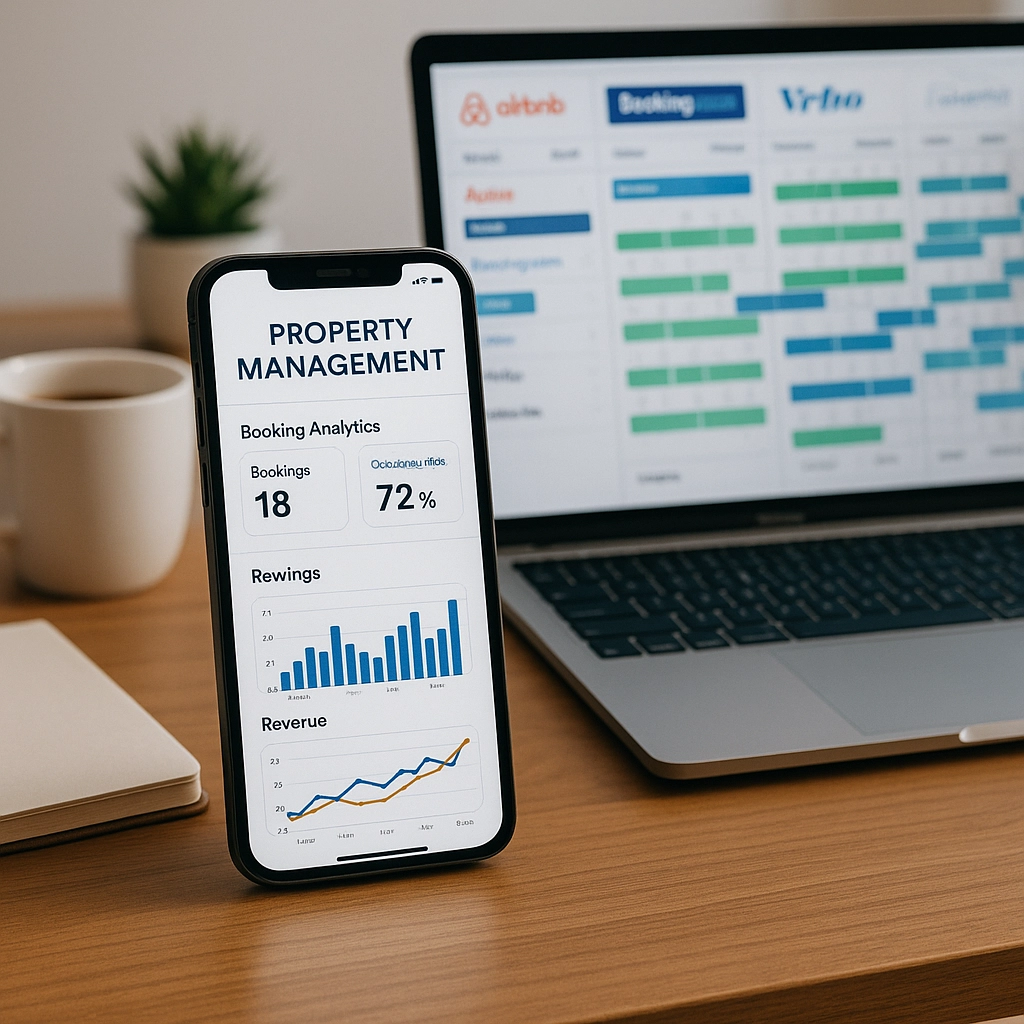
Serviced Apartments vs AirBnB Arbitrage: Where Serious Investors Find Better Returns in 2025
The short-term rental landscape in 2025 presents landlords with compelling opportunities to dramatically increase their property returns. As traditional rental yields stagnate, forward-thinking property owners are exploring two distinct paths: converting their properties into serviced apartments or partnering with operators for Airbnb arbitrage arrangements.
Both strategies can deliver substantially higher returns than conventional buy-to-let, but they serve different investor profiles and risk appetites. Here's what serious investors need to know about each approach and where the smart money is heading this year.
The Serviced Apartment Model: Owner-Operated Excellence
Serviced apartments represent the premium end of short-term lettings. Unlike standard Airbnb properties, these are professionally managed, fully furnished units targeting business travellers, relocating executives, and extended-stay guests seeking hotel-alternative accommodation.
Revenue Potential and Market Position
The serviced apartment sector commands premium nightly rates, typically 20-40% higher than comparable Airbnb listings. Corporate clients booking 7-30 day stays provide more predictable revenue streams than leisure travellers, with occupancy rates often exceeding 75% in major UK cities.
London serviced apartments achieve average nightly rates of £150-300 depending on location and specification, while regional cities like Manchester and Birmingham see rates of £80-150. The extended booking durations mean lower marketing costs and reduced turnover expenses.
Investment Requirements
Converting to serviced apartments requires substantial upfront investment. Professional interior design, commercial-grade furnishing, and technology infrastructure can cost £15,000-25,000 per unit. Properties need prime locations near business districts, transport hubs, or medical facilities to attract corporate bookings.

Operational Complexity
Success demands sophisticated operations including 24/7 guest support, daily housekeeping, maintenance teams, and compliance with multiple licensing requirements. Many operators employ dedicated staff or partner with specialist management companies to handle these demands.
Airbnb Arbitrage: The Scalable Alternative
Airbnb arbitrage offers a different path to short-term rental profits. Rather than converting owned properties, investors rent properties on assured shorthold tenancies and sublet them as Airbnb units, scaling portfolios without massive capital requirements.
The 2025 Market Reality
Current data shows Airbnb arbitrage achieving impressive returns despite market maturation. UK occupancy rates average 60-65% in prime locations, with nightly rates continuing upward trajectory. A typical two-bedroom flat rented for £1,800 monthly can generate £3,500-4,500 monthly revenue in London zones 2-3.
The key differentiator is speed of deployment. While serviced apartment conversion takes 3-6 months, arbitrage units can be operational within 4-6 weeks of lease signing.
Revenue Optimization Strategies
Successful arbitrage operators leverage dynamic pricing tools and demand forecasting to maximise yields. Properties in areas with strong transport links, tourist attractions, or business centres consistently outperform suburban locations.
Secondary cities offer particularly attractive opportunities. Manchester, Edinburgh, and Bristol show strong demand growth with less competition than London, enabling higher profit margins for operators who understand local market dynamics.

Comparing Investment Returns: The Numbers
Serviced Apartments: Higher Entry, Premium Returns
A £300,000 two-bedroom London apartment requires approximately £20,000 conversion investment. Monthly gross revenue averages £4,500-6,000, with net yields of 8-12% annually after all expenses. The premium positioning and corporate clientele provide stability but require significant management infrastructure.
Airbnb Arbitrage: Lower Entry, Scalable Profits
The same property type rented at £2,000 monthly can generate £4,000-5,000 monthly revenue through arbitrage, delivering £24,000-36,000 annual profit before operational costs. Initial investment is just £8,000-12,000 for furnishing and setup.
The arbitrage model allows investors to test multiple markets and property types without major capital commitment, scaling successful formulas across portfolios of 5-20+ units.
Risk Factors and Market Dynamics
Regulatory Landscape
Both models face evolving regulations. Many councils now require planning permission for short-term lets exceeding 90 days annually. Serviced apartments often need additional licensing as Houses in Multiple Occupation, while arbitrage operations must navigate lease restrictions and potential landlord relations issues.
Market Saturation Concerns
Central London shows signs of oversupply in standard Airbnb units, but demand remains strong for premium serviced apartments and well-located arbitrage properties. The key is avoiding over-saturated postcodes and focusing on areas with genuine accommodation shortages.

Operational Demands
Serviced apartments require hotel-standard service delivery, making them unsuitable for passive investors. Arbitrage offers more flexibility but demands active management of multiple properties, guest communications, and maintenance coordination.
Technology and Management Solutions
Professional short-term rental management has evolved significantly. AI-powered pricing tools, automated guest messaging, and integrated property management systems reduce operational overhead while maximizing revenue.
Successful operators utilize multi-channel distribution, listing properties across Airbnb, Booking.com, and direct booking platforms to capture diverse demand sources. Revenue management systems automatically adjust pricing based on local events, seasonal demand, and competitor analysis.
Channel management platforms synchronize availability across all booking sites, preventing double bookings while maintaining maximum exposure. These tools are essential for both serviced apartments and arbitrage operations seeking to optimize performance.
The Transition Strategy: Making the Move
For landlords considering the shift from traditional buy-to-let, the transition requires careful planning. Market research identifies optimal property types and locations, while financial modeling determines expected returns and break-even timelines.
Partnership vs Self-Management
Many property owners partner with specialist short-term rental management companies rather than attempting self-operation. Professional managers bring market expertise, operational systems, and economies of scale that individual landlords struggle to replicate.
These partnerships typically involve revenue sharing arrangements, with management companies handling everything from initial setup through ongoing operations. Property owners receive monthly statements and can focus on portfolio growth rather than day-to-day management.

Future Market Outlook
The short-term rental sector continues evolving rapidly. Business travel recovery drives serviced apartment demand, while leisure tourism fuels Airbnb bookings. Successful investors position themselves to capture both segments through diversified approaches.
Technology integration becomes increasingly crucial. Properties offering seamless check-in, smart home features, and premium connectivity command higher rates and better reviews. Investment in these capabilities pays dividends through improved occupancy and guest satisfaction.
Regional Expansion Opportunities
While London dominates headlines, regional markets offer compelling opportunities. Cities like Bath, York, and Canterbury show strong tourist demand with less competition, enabling higher profit margins for both serviced apartments and arbitrage operations.
Understanding local demand drivers – whether business travel, tourism, or event hosting – enables investors to tailor their approach and maximize returns in each market.
Making the Strategic Choice
The decision between serviced apartments and Airbnb arbitrage depends on individual circumstances, risk tolerance, and investment goals. Serviced apartments suit established investors seeking premium positioning and long-term asset appreciation. Arbitrage appeals to those wanting scalable, lower-capital entry into short-term rentals.
Both strategies significantly outperform traditional buy-to-let when executed professionally. The key is understanding market dynamics, operational requirements, and regulatory compliance to build sustainable, profitable short-term rental businesses.
For serious investors ready to transition from traditional rentals, professional guidance ensures optimal strategy selection and implementation. The short-term rental opportunity remains compelling for those prepared to embrace its operational demands and market complexities.
